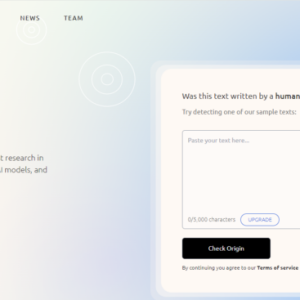Artificial Intelligence (AI) has been touted as the future of marketing, promising to revolutionize the way businesses connect with their target audience. However, as we look ahead to 2023, it is important to critically assess whether the hype surrounding AI is justified or if it is simply an overrated tool for marketers. While AI undoubtedly has its benefits, such as automating tasks and providing valuable insights, there are several reasons why it may be overrated for marketers in the near future. From the limitations of AI algorithms to the potential ethical concerns, this essay will explore the factors that contribute to the argument that AI may not live up to its lofty expectations in the marketing industry.
- Artificial Intelligence in Retail Business: How To Unlock a Rich New World Today
- 9 Clever Ways Amazon FBA Business Owners Can Use ChatGPT
- 12 Best Generative AI Tools That Will Change How You Work Forever
- ChatGPT Marketing: Creative Ways to Up Your AI Game
- 10 Clever Artificial Intelligence Use Cases For Your Online Businesses and Marketing Needs
Artificial intelligence has been one of the hottest topics this year, with claims that it will revolutionize various industries, including marketing. However, amidst the buzz and excitement, we’re also hearing why AI is overrated for marketers.
You are viewing: Reasons Why AI Is Overrated for Marketers in 2023
In this post, we will take a closer look at the reality of AI’s capabilities, debunking the hype and shedding light on its limitations.
The Hype Surrounding AI
Marketers are no strangers to overhyping new technologies, and AI is no exception. It’s part of our lifeblood. We ride the wave of trends and capitalize on them to gain reach and engagement.
The hype surrounding AI in marketing stems from its potential to revolutionize the industry. AI-powered technologies can automate repetitive tasks, enhance data analysis, and provide valuable insights for targeted marketing campaigns.
By leveraging AI, marketers can:
- improve customer segmentation
- personalize messaging
- optimize ad targeting
- predict consumer behavior
- provide instant customer support
For that reason, many have jumped on the bandwagon, touting the transformative power of artificial intelligence, particularly generative language models like ChatGPT. These claims may not be entirely baseless, but it is essential to maintain a balanced perspective and avoid inflating expectations beyond what current AI tools can deliver.
Marketers often tout the benefits of AI hype to gain more reach and attention:

See more : Prompt Hacking and Misuse of LLMs
But it’s important to approach this technology with a level-headed attitude, recognizing that it is not a magic solution that will instantly transform marketing efforts. AI is a tool, and like any tool, its effectiveness depends on how it is utilized and integrated into existing strategies.
As marketers, it is essential to take a step back, critically evaluate the claims, and consider the practical implications of AI adoption. While it is tempting to embrace the latest AI technologies, a balanced approach is necessary to ensure that the investment of time, resources, and effort yields tangible benefits.
Quality of AI Results
One major reason why AI may be overhyped is the quality of results it currently produces.
Although this will definitely improve in the future, the output of AI tools heavily depends on the quality of the input. Inaccuracies persist, and resolving them is a longstanding challenge for search engines like Google and Bing. Eliminating false information from search results remains difficult, which means that:
AI tools are only as good as the data they receive.
Thus, significant improvements in AI performance may not materialize in the next two or three years.
With the hype surrounding AI in marketing, it is crucial to debunk some common misconceptions and provide a more realistic perspective on its capabilities. Here are a few examples:
- Limited Knowledge Base: ChatGPT’s knowledge base is limited to 2021, which means it can only generate responses based on the data it was trained on prior to this time. It doesn’t have the ability to learn or adapt to new information. Plus, it can’t crawl the web, so you can’t, for example, ask ChatGPT to provide 2023 stats on SEO. Since it can’t browse the internet, it can’t perform things that Google can do.
- Quality of Results: One common misconception is that AI-powered tools, such as ChatGPT, consistently produce exceptional results. However, the reality is that the quality of the output heavily depends on the input. If the input data or prompts provided to the AI tool are not comprehensive or accurate, the generated content or recommendations may fall short of expectations.
- Inaccuracies and False Information: AI tools are not immune to inaccuracies and the presence of false information. Major search engines like Google and Bing have been grappling with the challenge of combating inaccuracies for years. Even with advancements in AI technology, completely eradicating false information from search results remains a difficult task.
- Immediate Transformative Power: Another misconception is that AI will instantaneously revolutionize marketing efforts and yield remarkable results overnight. While AI certainly has the potential to enhance marketing strategies, its full impact takes time to manifest. Implementing AI requires careful planning, data collection, training, and iterative refinement.
- Legal and Ethical Challenges: As AI technology evolves, legal and ethical challenges come to the forefront. AI-generated content and designs may raise intellectual property concerns and give rise to legal battles. Just as YouTube faced legal battles initially, AI-powered marketing tools may encounter similar hurdles.
Limitations and Challenges
AI offers promising potential for marketing, but it is crucial for marketers to be aware of its limitations and navigate the associated challenges effectively. By understanding these drawbacks, you can develop strategies that leverage AI’s strengths while mitigating its limitations.
See more : Seamless AI Review: Is It the Ultimate Tool for Sales Prospecting?
Let’s go over some of the key limitations and challenges of AI in marketing:
- Data Quality and Bias: AI systems heavily rely on data for training and decision-making. However, the quality and diversity of the data used can significantly impact the performance of AI algorithms. If the training data is biased or incomplete, it can lead to biased or inaccurate outputs.
- Lack of Contextual Understanding: While AI algorithms excel at processing vast amounts of data, they often struggle with understanding context. This limitation becomes evident in marketing, where understanding nuanced customer preferences, emotions, and cultural factors is crucial. AI may generate generic or impersonal content that lacks the human touch necessary for building genuine connections with customers.
- Ethical and Privacy Concerns: AI raises ethical concerns related to privacy, data and website security, and consumer trust. Marketers must handle customer data responsibly and transparently, ensuring compliance with privacy regulations, such as GDPR. AI-powered marketing tools must respect user privacy and provide clear consent mechanisms. You should be transparent about the use of AI in your strategies to foster trust and maintain ethical standards.
- Over-reliance on AI: Relying too heavily on AI without human oversight can lead to missed opportunities and unintended consequences. While AI can automate certain tasks and optimize processes, it cannot replace human intuition, creativity, and strategic thinking:

- Cost and Resource Intensiveness: Implementing AI technologies can be resource-intensive and require significant investment. Acquiring high-quality data, training and fine-tuning AI models, and maintaining infrastructure can be costly.
Final Thoughts on Why AI Could Be Overrated for Marketers
AI’s potential impact on marketing is undeniable, but it is crucial to separate the hype from the reality.
Though AI tools in marketing have made significant progress, it’s true that they still have some limitations compared to the grand claims often made. For example, while AI can assist in automating certain tasks and analyzing data, it may struggle with complex decision-making that requires human intuition and creativity.
By maintaining a realistic view and exploring AI with tempered expectations, businesses can leverage its capabilities effectively while understanding its current limitations.
Of course, this is only for the here and now. By 2024, AI tools may hit entirely new milestones of capability, further pushing the boundary that we thought was possible for use in marketing. Who knows? Maybe we’ll all be living in a Ready Player One world by then.
If you’re ready to grow your business with AI, Single Grain’s AI & growth experts can help!👇
Repurposed from our Marketing School podcast.
That’s a wrap on “Reasons Why AI Is Overrated for Marketers in 2023” We hope you’ve found a trove of useful insights and fresh perspectives. Your opinions and ideas matter to us—join the conversation below and share your take! Hungry for more tech insights? Dive into our diverse collection of articles where innovation meets practicality. Discover More AI Softwares.
Stay in the loop with the latest in AI and tech – your journey into the digital future continues at newslength.com.
#Reasons #Overrated #Marketers
Source: https://newslength.com
Category: AI





